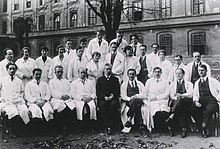You can help expand this article with text translated from the corresponding article in German. (March 2020) Click for important translation instructions.
|

Lydia Sicher (1890–1962), born Lydia Bak, was an Austrian-born medical doctor and psychologist. She founded the Institute for Individual Psychology.
Life
Sicher married Harry Sicher in 1913, and they both then volunteered as doctors in World War I for the Austro-Hungarian Empire.
She later studied and worked with Alfred Adler, taking over him as director of the Clinic of Nervous Diseases at Maria Hilfer Hospital. George R. Bach, a co-worker of hers at the University of Southern California in the 1950s, spoke on her psychological techniques that "It was stressful therapy, But never unproductive, always real, genuine, and truth oriented." Her techniques were evocative of the Hegelian dialectic, wherein she used conflict with the patient as a means of arriving at truth.
References
- ^ Triarhou, Lazaros C (December 2019). "Women neuropsychiatrists on Wagner-Jauregg's staff in Vienna at the time of the Nobel award: ordeal and fortitude". History of Psychiatry. 30 (4): 393–408. doi:10.1177/0957154X19861515. PMID 31303052. S2CID 196616772.
- "DR. LYDIA SICHER DIES; Psychiatrist on Coast Worked With Adler in Vienna". The New York Times. 4 April 1962. ProQuest 115736849.
- ^ Bach, George R. (May 1978). "Lydia Sicher as therapist". Journal of Individual Psychology. 34 (1): 85–6. PMID 357661. ProQuest 1303448497.
This biographical article related to medicine in Austria is a stub. You can help Misplaced Pages by expanding it. |